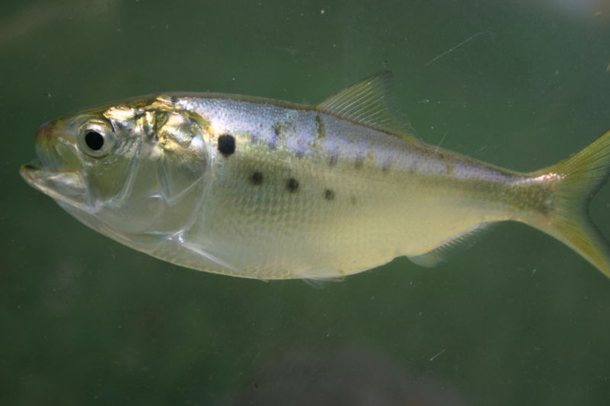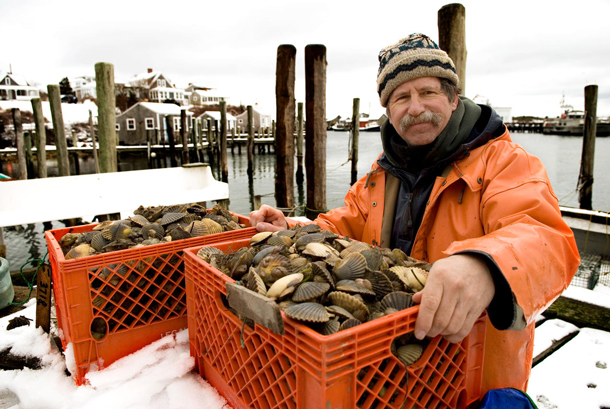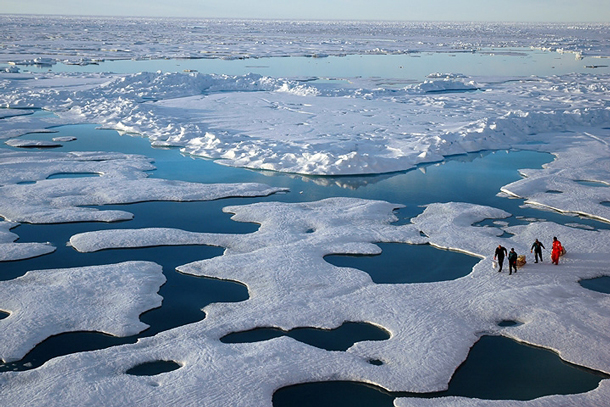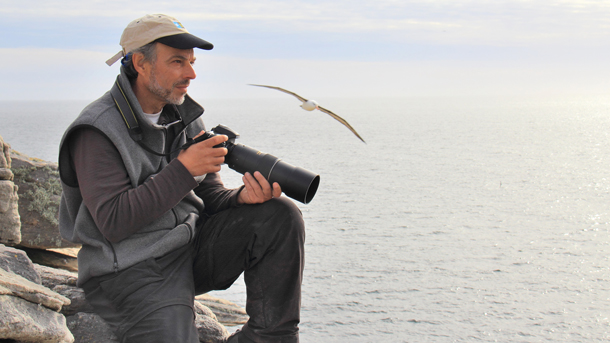Ocean Health: Some Hope and Much Peril
Air Date: Week of March 9, 2018

Menhaden are a key species in the marine food chain, bridging plankton and large predators. In recent years large schools of menhaden have made a comeback in the coastal Atlantic Ocean off North America. (Photo: Brian.gratwicke, Wikimedia Commons CC BY 2.5)
Host Steve Curwood discusses the state of the world’s oceans with MacArthur ‘genius’ and ecologist Carl Safina. Climate change and ocean acidification are cause for alarm but Safina says better fishery management has resulted in a growth of some fish stocks.
Transcript
CURWOOD: It’s Living on Earth, I’m Steve Curwood. Tens of thousands of dead starfish, crabs, and other sea creatures recently washed up on beaches in the UK.
Scientists are blaming the deaths on a severe cold snap that brought freezing temperatures and snow to much of Europe. Wildly fluctuating weather is consistent with what scientists expect from a changing climate. MacArthur ‘genius’ and noted ecologist Carl Safina says we shouldn’t be surprised.
SAFINA: In the 90s, we used to hear that global warming was coming. Now, every place I go there is something going on that has to do with the fact that the climate is warmer than it used to be.
CURWOOD: Indeed. So, how exactly is the warming, is the climate disruption affecting the oceans and the plants and animals that live there?
SAFINA: Well, and in a variety of different ways. I mean, it depends a little bit on what system in the ocean you're talking about. Things in the tropics are having a harder time as water warms up and things in the temperate latitudes are moving toward the poles. So, you see some things that can move quickly, like fish, spending more of their year farther north than they used to, things that cannot move very much like the lobsters in Long Island Sound where I live, you know, they're sort of trapped in Long Island Sound, and if you move north you wind up on the Connecticut Turnpike. So, the lobsters over the last 15 years have basically died, almost all the lobsters in Long Island Sound have died. And a friend of mine who used to make a living catching them there, he is now a nurse.

Ocean acidification, and the resulting thinner shells on shellfish, are particularly worrying to shell fishermen. (Photo: Massachusetts Office of Travel and Tourism)
CURWOOD: Talk to me about ocean acidification. How is this related to the warming and what exactly is happening to the oceans?
SAFINA: All of our combustion, all the engines that we run, all the forest and farms that we are burning, that sends carbon dioxide up into the air and a lot of it reaches the face of the ocean, the surface of the ocean. At that interface a lot of it dissolves into the water. When it dissolves in the water, it creates a short chemical reaction that releases hydrogen atoms, and those hydrogen ions in the water are measured in a way that we call Ph, h for hydrogen, and the more of them there are, the more we consider it to be more acidic, or more toward the acid end of the Ph scale, and everything that makes a shell in the ocean, their shells are getting thinner and weaker, or the larval forms can't even make their first shells, and they quickly die and dissolve or become fatally deformed, and it's not a few small little obscure things. It's things like all of our shellfish and all of the coral reefs of the world and much of the plankton. That's really an enormous, enormous effect and an enormous change.
CURWOOD: So, a lot of humanity enjoys eating fish. How are fish stocks doing around the world right now?
SAFINA: Well, it's interesting. If you had asked me this around 20 years ago which I think you did ask me this around 20 years ago,
CURWOOD: Indeed!

Melting ice in the Arctic has the potential to disrupt the Gulf Stream, which keeps Europe warmer that it would be otherwise. (Photo: Jeremy Potter / NOAA)
SAFINA: I would have said that basically all of the fish populations in the world are being rapidly depleted, and that was true at the time. Since then, because of a lot of effort that we expended in the United States to improve the federal laws that govern fishing, we have recovering trends in many of the important ocean fish that are fished commercially and that people like to eat. Some of the in shore fish, like some of the flounders that we have in our region - we have summer flounder that's been doing a lot better, we have black sea bass that's kind of exploding in population size and number.
Another thing that was pretty interesting was that there's a fish that people do not eat called Menhaden - it's related to Herring but people don't eat it - it's got an incredibly high oil content which means also it's got a lot of calories and people usually catch them in gigantic quantities and create fish meal and animal meal out of them that are fed to livestock or used in fish farms and they were heavily depleted. But five years ago a cap was put on them and they couldn't catch as many and they started recovering noticeably almost immediately, and because they are such high calorie fish, everything that eats fish was moving into the coastal waters.
We would be out fishing in my boat just a mile or two from shore and there be whales around the boat. There were schools of sharks in the surf, behavior that people never thought these kind of sharks would do and they were just chasing these fish all over the place. It became an ocean that I had never seen before. It was not the ocean of my youth or my whole previous lifetime and it made me wonder what else the coast must have looked like that we don't even imagine in the incredible abundance that was here that most of which we've lost. But this was a tremendous recovery trend.
CURWOOD: In the coral reefs I understand there's some new research that looks at how plastic is getting all entangled in those corals and causing a lot of problems. What's going on with that?
SAFINA: It's not uncommon to see plastic tangled around coral. Of course, as there is wave action or currents, it helps to break the coral up. Anything that attaches to coral usually grows bacteria or does something that is bad for coral while it's stuck on them. It can shade them out, the bacteria can grow on that item and then jump over to the coral. It can create surfaces that baby coral cannot attach to and get growing in life or they may attach to the wrong thing where they - they simply can't survive. That part is not just the problem with plastic. It's even a problem with seaweed. On a lot of coral reefs where there's been too much fishing, the fish that eat seaweed are so depleted that the reef gets overgrown with seaweed and then the fronds of the seaweed grow bacteria that can infect the corals.
CURWOOD: So, the Trump administration recently announced their intention to allow offshore oil and gas drilling for nearly all US coastal waters. Carl, I believe you wrote an entire book about the Deepwater Horizon Oil blowout. What did you call it? A sea in flames?
SAFINA: Yes.
CURWOOD: So, talk to me about how more oil drilling affect the ocean in coastal areas of the US.
SAFINA: Yes, you know, most people think that oil exploration and drilling is bad because you get these occasional catastrophic spills like the Exxon Valdez and you get these blowouts like the Deepwater Horizon, but the real catastrophe is the oil that we just take every day, the daily grind of extraction and everything that goes with it. You have to build big ports, everything gets dirty, you have to build big refineries, you have to build highways, and it's this daily grind that really creates over time more damage than the catastrophic spills as damaging as they are.
Then, when you're exploring you have to make a tremendous amount of noise, noise that many marine mammals and whales cannot take. It can sometimes deafen them or cause them to panic from the deep and get the bends as they come to the surface too quickly, meaning that they can die or their eardrums can rupture. They may not be able to hear their own sonar, so they won't be able to figure out where the food is that they're trying to hunt. There's a lot of stuff about this whole business that is nasty.

Carl Safina (Photo: Pat Paladines)
CURWOOD: You talked about the rising fish stocks as a positive sign. Come the end of the day, what gives you hope these days, Carl Safina?
SAFINA: Well, I have a definition of hope, and hope to me is the ability to see how things could be a lot better. Plastic is a problem. OK, well, we know that there are other materials being developed. Energy is a problem...we know that there are clean energy technologies that are starting to really take hold in some other countries of the world. We see that when people do the right things and work toward the right things that the problems either get better or they get solved, and that's what gives me hope.
CURWOOD: Prize-winning ecologist Carl Safina is the author of several books about the ocean and animals. Carl thanks so much for taking time with us today.
SAFINA: Always a great pleasure Steve.
Links
Living on Earth wants to hear from you!
Living on Earth
62 Calef Highway, Suite 212
Lee, NH 03861
Telephone: 617-287-4121
E-mail: comments@loe.org
Newsletter [Click here]
Donate to Living on Earth!
Living on Earth is an independent media program and relies entirely on contributions from listeners and institutions supporting public service. Please donate now to preserve an independent environmental voice.
NewsletterLiving on Earth offers a weekly delivery of the show's rundown to your mailbox. Sign up for our newsletter today!
 Sailors For The Sea: Be the change you want to sea.
Sailors For The Sea: Be the change you want to sea.
 The Grantham Foundation for the Protection of the Environment: Committed to protecting and improving the health of the global environment.
The Grantham Foundation for the Protection of the Environment: Committed to protecting and improving the health of the global environment.
 Contribute to Living on Earth and receive, as our gift to you, an archival print of one of Mark Seth Lender's extraordinary wildlife photographs. Follow the link to see Mark's current collection of photographs.
Contribute to Living on Earth and receive, as our gift to you, an archival print of one of Mark Seth Lender's extraordinary wildlife photographs. Follow the link to see Mark's current collection of photographs.
 Buy a signed copy of Mark Seth Lender's book Smeagull the Seagull & support Living on Earth
Buy a signed copy of Mark Seth Lender's book Smeagull the Seagull & support Living on Earth

